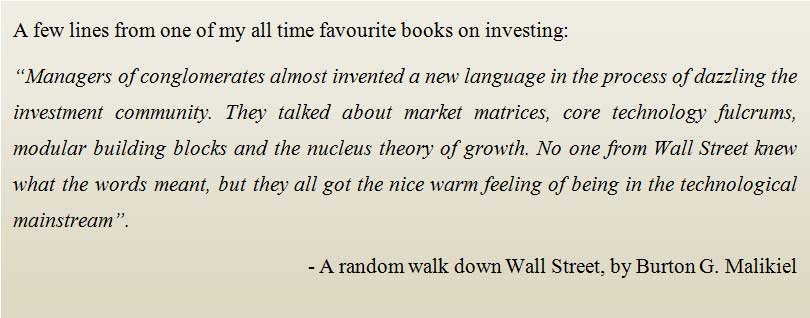For years I struggled to find out why some companies which cater to a small group of buyers use expensive mode of television commercials to market their products.
Imagine a company which manufactures train engines coming out with a commercial:
“Our engines get you their faster”, fair enough and I am sure they do. Now, am I (or anyone other the Government of India) looking to buy train engines? Why am I watching this commercial? Call the Government of India . . . . Email them . . . . Talk to someone in the ministry. That’s your only market (given that railways are not open to private investments).The litmus test is easy. If you see a commercial and you can validly pose a question to a friend as: “Have you tried the new chips by Lays or the new chocolate by Cadbury” then the commercial may be justified. But, “you know, let’s buy some train engines to get to work”, really?
Marketing Gimmicks
Selling shares or selling products? Look around and you will find a lot of such marketing gimmicks meant to get people interested in buying shares in a company and not so much its products. Now, this may not always be wrong because companies do and for sure should want to create brand awareness or talk about how ethically they operate. All I’m saying is, Be careful! Question your reasons for buying and you will be able to avoid the Bad Stock.
A very dear friend of mine (who undoubtedly is a marketing genius) asked me to sell research reports with a picture of an animal next to a stock. This without a doubt would have made for one of the best marketing gimmicks on print. Full marks for creating the image idea below:

Taking the help of monkeys and tigers to justify stock purchases? What’s a next, fox, leopards and so on? I think the subject is slightly more serious.
It is far too easy to get carried away by the buzz and gleam of such marketing gimmicks. When you form an opinion, work on it, and then …. Do it again. It is really easy to be careful and no one should be able to convince you otherwise.
Flashy images, statistical data, predictions and projections about the future etc., should if at all help you avoid the bad stock and not otherwise. Any successful investor will tell you that in 99.99 % cases such marketing has absolutely nothing to do with the product it tries to sell. Similarly, just because you like a stock or a business model, or because everyone thinks that a particular stock or business model is set for exponential growth should never alone be a reason to buy it.
What can you do to ensure that you don’t end up buying well marketed stocks?
- Do one of the 2 things (preferably both) – either talk to someone who does not approve of the stock or read about all the negative news flow about the company before going ahead and buying the stock. Google should be your best friend; a little search effort will disclose a lot!
In light of what you discover, re-consider your decision. If you are still as bullish on the stock, then it may well be a serious contender to be included in your portfolio.
- Never buy a stock because it made someone very rich or only because it has continued to increase in price. Remember the guy who gave the best investment advice said – “The dumbest reason in the world to buy a stock is because it is going up”.
- If you don’t understand what the company does, leave it, chances are it does nothing that is worth your attention.
- Finally, do not buy or sell based on tips, rumours, internet forum discussion boards etc.



Dear Mr Rajat
I am new to stock trading but keenly interested in using my retirement period effectively. I found your articles very meaningful and productive. Keep up the good job. God bless.
Latha